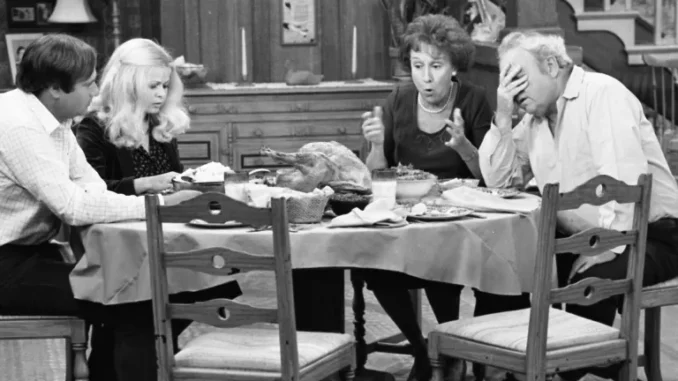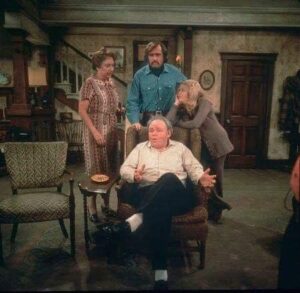
All in the Family debuted Jan. 12, 1971 on a nervous network. Fifty years later, it still delivers the most uneasy laughs on television.
All in the Family is roundly considered a touchstone for television achievement now, but when it debuted 50 years ago, even the network carrying it hoped it would fizzle quickly and unnoticed. CBS put an army of operators at phone lines expecting a barrage of complaints from offended middle Americans demanding its cancellation. Those calls didn’t come. What came was a deluge of support from people hoping this mid-season replacement was a permanent addition to the network’s lineup. The premiere episode contained a considerable list of “television firsts.” One of these rarities continues to remain scarce on network TV: creator Norman Lear trusted the intelligence of the viewing audience. To celebrate All in the Family’s 50th anniversary, we look back at its journey from conception to broadcast, and how it continues to influence and inform entertainment and society today.
“I think they invented good weather around 1940.”
American sitcoms began shortly after World War II, and primarily focused on the upper-middle class white families of Father Knows Best, Leave It to Beaver, and The Adventures of Ozzie and Harriet. I Love Lucy’s Ricky Ricardo, played by Cuban-American Desi Arnaz, ran a successful nightclub. The Honeymooners was a standout because Jackie Gleason’s Ralph Kramden was a bus driver from Bensonhurst (the actual address on that show, 328 Chauncey Street, is in the Bedford–Stuyvesant section of Brooklyn). American TV had little use for the working class until the 1970s. They’d only paid frightened lip service to the fights for civil rights and the women’s liberation movements, and when the postwar economy had to be divided to meet with more equalized opportunities there was no one to break it down in easy terms. The charitable and likable Flying Nun didn’t have the answer hidden under her cornette. It wasn’t even on the docket in Nancy, a 1970 sitcom about a first daughter. The first working family on TV competing in the new job market was the Bunkers, and they had something to say about the new competition.
“If It’s Too Hot in The Kitchen, Stay Away from The Cook.”
Archie Bunker dubbed his son-in-law, Michael Stivic, played by Rob Reiner, a “Meathead, dead from the neck up.” This was the same dubious endearment Lear’s father Herman called him. The same man who routinely commanded Lear’s mother to “stifle herself.” Lear’s mother accused her husband, a “rascal” who was sent to jail for selling fake bonds of being “the laziest white man I ever saw,” according to his memoir Even This I Get to Experience All three lines made it into all three of the pilots taped for All In the Family. When Lear’s father got out of prison after a three-year stretch, the young budding writer sat through constant, heated, family discussions. “I used to sit at the kitchen table and I would score their arguments,” Lear remembers in his memoir. “I would give her points for this, him points for that, as a way of coping with it.”

“Patience is a Virgin”
After Lear beat CBS to the rights to adapt Till Death Us Do Part he offered the show to ABC. When it was being developed for the television studio, the family in the original pilot were named the Justices, and the series was titled “Justice for All,” according to a 1991 “All in the Family 20th Anniversary Special.” They considered future Happy Days dad Tom Bosley, and acclaimed character actor Jack Warden for the lead part, before offering the role to Mickey Rooney. According to Even This I Get to Experience, Lear’s pitch to the veteran actor got to the words “You play a bigot” before Rooney stopped him. “Norm, they’re going to kill you, shoot you dead in the streets,” the Hollywood icon warned, asking if Lear might have a series about a blind detective with a big dog somewhere in the works.
“We’re just sweeping dirty dishes under the rug.”
The very first episode tackled multiple issues right away. It discussed atheism, with Michael and Gloria explaining they have found no evidence of god. The family dissects affirmative action, with Archie asserting everyone has an equal chance to advance if they “hustle for it like I done.” He says he didn’t have millions of people marching for him to get his job, like Black Americans. “His uncle got it for him,” Edith explains, with an off-the-cuff delivery exemplifying why Stapleton is one of the all-time great comic character actors. The family argues socialism, anti-Semitism, sausage links and sausage patties. The generation gap widens as Archie wonders why men’s hair is now down to there, while Gloria’s skirt got so high “all the mystery disappears” when she sits down.
“What I say ain’t got nothing to do with what I think.”
Politicians and pundits worried about how the series might affect racial relations. The country had experienced inner city riots, battle lines were drawn over school desegregation, busing children to schools was met with violent resistance. Did All In the Family undermine bigotry or reinforce racism? Were people laughing at Archie or with him? Was it okay to like Archie more than Mike?
“If you call me Cute one more time, I swear I’ll open a vein.”
As cannot be overstated, All in the Family set many precedents, both socially and artistically. The Bunker family is an icon on many levels, Archie and Edith’s chairs are at the Smithsonian. But Archie Bunker is also the Mother Courage of TV. The antithesis of the bland sitcom characters of the time, he also wasn’t the character we hated to love, or loved to hate. Archie was the first character we weren’t supposed to like, but couldn’t help it. This phenomenon continues. The next TV character to take on the iconic mantle was probably Louis De Palma on Taxi. Audiences should have wanted to take a lug wrench to his head, but Danny De Vito brought such a diverse range of rage and vulnerability to that part it was named TV Guide’s most beloved character for years.
“I hate entertainment. Entertainment is a thing of the past, now we got television.”
Television can educate as much as it wants to entertain, and All in the Family taught the viewing audience a whole new vocabulary. The casual epithets thrown on the show were unheard of in broadcast programming, no matter how commonplace they might have been in the homes of the people watching. When Sammy Davis Jr. comes to Bunker house in the first season, every ethnic and racial slur ever thrown is exchanged. In another first season episode, and both the unaired pilots, Archie breaks down the curse word “Goddamn.” But a large segment of the more socially conservative, and religious, audience thought All in the Family said whatever they wanted just because they could get away with it.